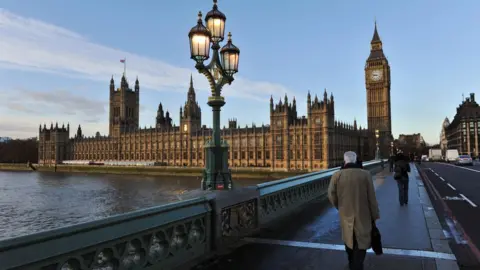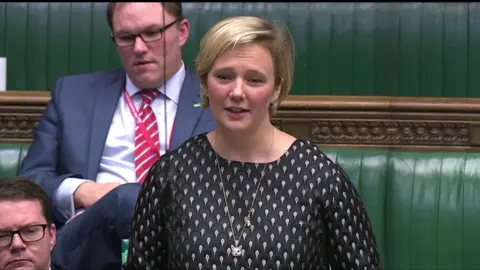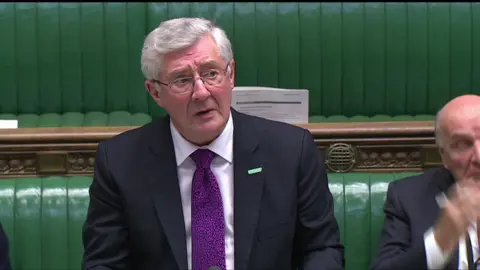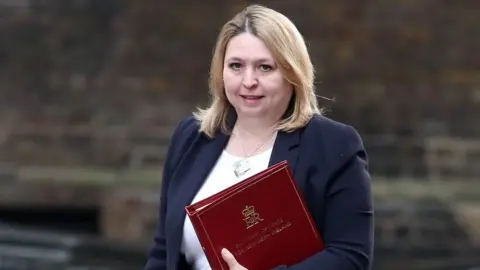Bill gives NI civil servants greater flexibility
 BBC
BBCLegislation to give Northern Ireland civil servants more legal clarity to make decisions in the absence of ministers has passed at Westminster.
An amendment to it which will require the secretary of state to provide guidance on the law regarding abortion and same-sex marriage also passed.
The amendment, proposed by Labour MPs Stella Creasy and Conor McGinn, passed by 207 votes to 117.
It will not change the law in Northern Ireland.
Earlier in the debate, Karen Bradley said that while she sympathised with many of the amendment's supporters' concerns she opposed the move.
The Northern Ireland (Executive Formation and Exercise of Functions) Bill passed by 344 to 26 and now proceeds to the House of Lords.
Greater flexibility
Introducing the bill to the Commons on Wednesday afternoon, Karen Bradley described it as "an important step" towards the goal of restoring devolution.
The bill aims to give civil servants greater flexibility when it comes to making decisions.
They will be supported with guidance from the Northern Ireland secretary, but the final decision will rest with the civil servants.

Analysis by BBC News NI Political Editor Mark Devenport
The Northern Ireland Secretary argued in the House of Commons that the measure "provides the time and space" for the government to continue its engagement with the Stormont parties.
Critics aren't convinced. They point out the government's arm has been twisted by two court cases - one brought by environmentalists and another by survivors of historic child abuse.
In that context, the sceptics regard this latest initiative as an attempt by the Northern Ireland Office to maintain the current state of administrative limbo without taking any decisive action.
The Executive Formation and Exercise of Functions Bill contains a date of 26 March 2019 by which ministers should be appointed.
Before you mark that deadline in your calendar in indelible ink, it's worth noting that the bill also includes possibility to extend that period for up to five months.
Given that the end of March 2019 is also the deadline for the UK's exit from the EU - an issue which has further polarised the Stormont politicians - it seems highly likely that the five month extension might be required.

Speaking during a debate on the matter in the House of Commons, Ms Creasy said she and Mr McGinn had "no desire to delay this important legislation", but that there was "a crucial element of this legislation missing" is a concern.

"I also think that the people of Northern Ireland, who have already seen so much democratic dysfunction, frankly deserve better from this house," she added.
The Walthamstow MP had previously said the amendments would require the secretary of state to act on the impact of incompatibility between abortion and same sex marriage legislation in Northern Ireland and what the courts say are human rights.
"It doesn't write any new legislation for Northern Ireland", she said.
"But it does say that those human rights obligations, the things that we've all sworn to uphold in the Good Friday Agreement, matter and therefore the secretary of state should be looking to see what she can do to address them," she added.
Meanwhile, Shadow Secretary of State for Northern Ireland Tony Lloyd described the bill as "grossly inadequate", adding:
"It's ironic that the secretary of state brings this legislation forward, but can say nothing helpful about the need for compensation for the victims of sexual and institutional abuse that [the Hart Inquiry] did so much to unearth."

Northern Ireland has been without an executive since January 2017.
In the absence of ministers, civil servants were supposed to take big decisions. But that stopped in July when a court ruled a senior civil servant did not have the power to approve a controversial incinerator at Mallusk.
Decisions which involve high levels of public spending or a change in policy are unlikely to be taken by officials and will instead be left for ministers.
 AFP/Getty
AFP/GettyThe bill will also give UK government ministers the power to make public appointments.
These will apply to the Northern Ireland Judicial Appointments Commission, Northern Ireland Policing Board, the Probation Board and the Police Ombudsman.
Secretary of State Karen Bradley has said new legislation provides the "best chance" of delivering power sharing.
It will also suspend the secretary of state's legal duty to call a fresh assembly election.
A Commons first
During a separate debate on Wednesday afternoon the Irish language was spoken in the House of Commons for the first time in more than a century.
Welsh MP Liz Saville-Roberts spoke in Irish during a debate on the introduction of an Irish Language Act in Northern Ireland.
Ms Saville-Roberts, Plaid Cymru's leader in Westminster, urged Karen Bradley to implement the act as part of the British government's commitments under the 2006 St Andrews Agreement.
She said: "Is cearta daonna iad cearta teanga agus tá cothrom na Féinne tuilte ag lucht labhartha na Gaeilge."
House of Commons Speaker John Bercow asked what it translated to and Ms Saville-Roberts replied: "Language rights are human rights and the Irish speakers of Ireland deserve fair play."
